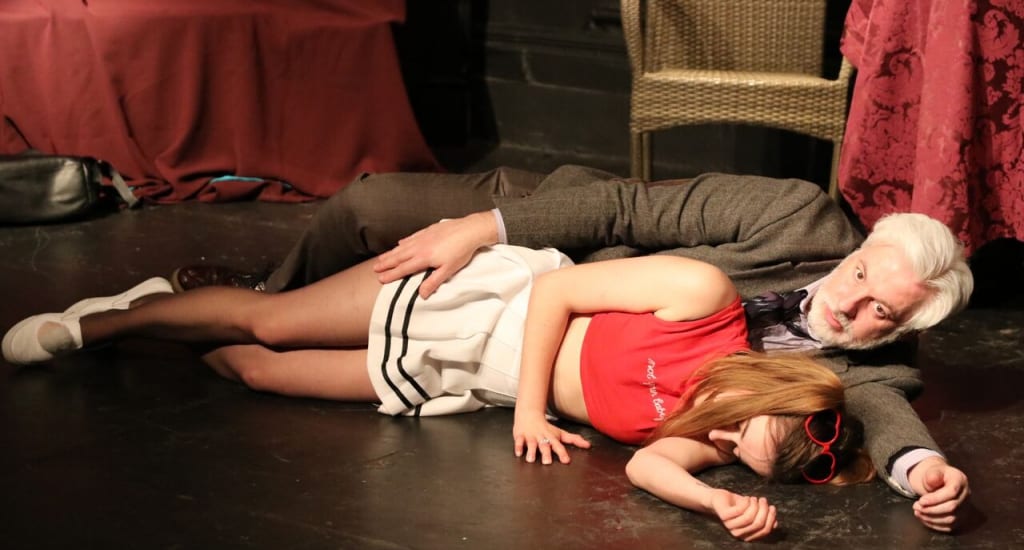Lion and Unicorn Theatre is a small space which makes for a perfect setting for the claustrophobic intimacy and interrupted secrets, and hidden lives, of Victor Sobchak’s ‘Lolita’. The audience feel like they are eavesdropping on the action– uncomfortably, semi-exposed, and the benches jut into the stage, while the actors continue to speak as they enter and exit the theatre-space, jostling with the viewers.
The play is described as being ‘after V. Nabokov’, so though it broadly follows the action of the original novel (including passages taken directly from the text) – which describes the lust/love of middle-aged Humbert for pubescent Dolores Haze/Lolita – there are new adjustments to the story, plus a switch of setting to a more recent English one (references are made to Soho and London, while modern slang and musical background pepper the conversation throughout). There is also an ever-presence of societal awareness of child abuse in the drama – the word ‘paedophile’ is heard a number of times – which moves it away from Nabokov’s original 1950s Americana.
George Xander plays a Dostoevskian, or ‘Steppenwolf’-style Humbert – pale, haunted, twitchy, academic, with shades of Ralph Fiennes in his more downtrodden roles. In addition there is a younger narrator – Harry Revel as a knowing, slightly devilish ‘Nabokov’ – who comments on the action, watches from the audience, talks to Humbert, consoles and challenges him. This works well in terms of attempting to replicate the various intellectual machinations and flourishes which Humber t attempts in the novel in order to justify his desires to the reader (and himself), though with the play being only about an hour an half long we are obviously only given a condensed version of such twists and turns (and dead ends).
The compressed timescale is a clear weakness in the first act, which focuses on Humbert’s integration into the Haze household and his furtive longing for Lolita- Caroline Koziol, while her mother Charlotte-Elena Knight desperately tries to ensnare him as her own future husband. The book has an uncomfortable, hothouse atmosphere in this section, as we follow Humbert’s ‘seduction’ of Lolita in slow, painful incremental stages, day by day, hour by hour. Here however, Humbert is seen as irresistible to the household, almost immediately, merely by seemingly just hanging around.
The brevity also has the effect of turning some of the other characters into ciphers and caricatures who merely appear for comic effect: Nabokovian satire is present here, but without the underlying sweetness and melancholy he is able to inject into even the most absurd or cruel pen portrait. At times we seemed to be watching the events as if they were being recalled in movie flashback: we quickly moved from set-piece to set-piece as it hurried the drama along, without the opportunity to explore the dark edges around the main presentation. More tellingly, this also affected the depiction of Lolita herself – her own real feelings were only allowed to emerge briefly at the end of the play, though perhaps this was intentional, as she is finally allowed to break free of Humbert’s caging view of her, and is now revealed to the audience free of the image we have previously seen only filtered though his eyes.
But this play was an interpretation of the novel, a response to it, rather than a direct dramatisation, so should be taken as such. It was very enjoyable, and superbly acted by a talented cast (many with multiple roles) in quick-fire style, with great energy – though still managing to retain hints of the uneasy lingering aftertaste of the original text. Laughter in the dark.

